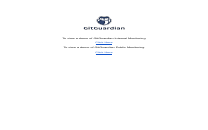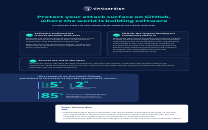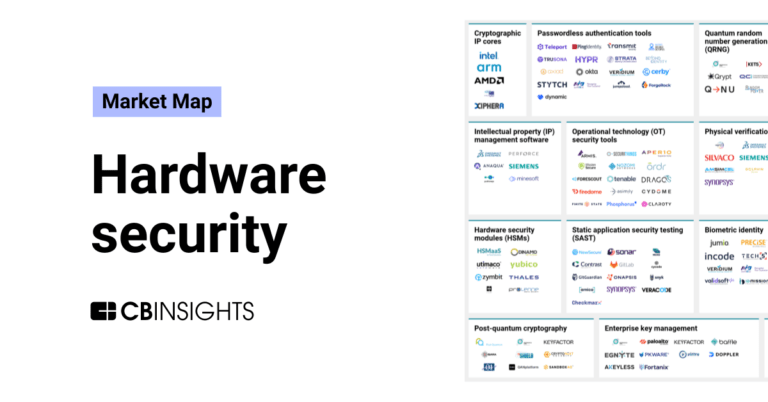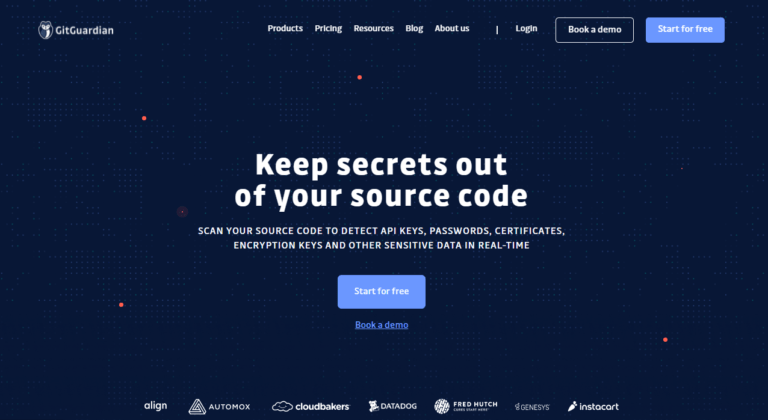
GitGuardian
Founded Year
2017Stage
Incubator/Accelerator | AliveTotal Raised
$56.22MMosaic Score The Mosaic Score is an algorithm that measures the overall financial health and market potential of private companies.
-82 points in the past 30 days
About GitGuardian
GitGuardian is a cybersecurity startup. It operates in the technology industry, focusing on the issue of secrets sprawling through source code. The company offers services that automate secret detection for application security and data loss prevention, helping developers, operations, security, and compliance professionals secure software development and enforce policies across all their systems. GitGuardian's solutions monitor both public and private repositories, detect secrets, and alert users to allow for quick investigation and remediation. It was founded in 2017 and is based in Paris, France.
Loading...
GitGuardian's Product Videos


ESPs containing GitGuardian
The ESP matrix leverages data and analyst insight to identify and rank leading companies in a given technology landscape.
The secrets management & detection market focuses on tools and solutions designed to manage and detect sensitive information, often referred to as "secrets," within an organization's IT infrastructure. Secrets can include sensitive data such as passwords, API keys, cryptographic keys, and other confidential information that, if exposed, could lead to security vulnerabilities and unauthorized acces…
GitGuardian named as Outperformer among 15 other companies, including Google Cloud Platform, Microsoft, and HashiCorp.
GitGuardian's Products & Differentiators
GitGuardian
The first product is the GitGuardian platform, which is our flagship product. This is the code security platform that offers automated Secrets Detection, Infra as Code Security, and Honeytoken capabilities, for Dev, Sec, and Ops teams. Secrets Detection scans corporate repositories, private or open source. The platform is natively integrated with GitHub, GitLab, Bitbucket, and Azure DevOps. It includes an API as well to integrate anywhere in users' toolchain used by their developers. The platform comes in the form of a dashboard used by Application Security teams to facilitate a secure software delivery pipeline. Available in SaaS and On-Prem.
Loading...
Research containing GitGuardian
Get data-driven expert analysis from the CB Insights Intelligence Unit.
CB Insights Intelligence Analysts have mentioned GitGuardian in 2 CB Insights research briefs, most recently on Feb 20, 2024.

Feb 20, 2024
The hardware security market mapExpert Collections containing GitGuardian
Expert Collections are analyst-curated lists that highlight the companies you need to know in the most important technology spaces.
GitGuardian is included in 2 Expert Collections, including Cybersecurity.
Cybersecurity
9,329 items
These companies protect organizations from digital threats.
Defense Tech
1,268 items
Defense tech is a broad field that encompasses everything from weapons systems and equipment to geospatial intelligence and robotics. Company categorization is not mutually exclusive.
Latest GitGuardian News
Sep 17, 2024
Beyond human IAM: The rising tide of machine identities Remember when managing user accounts was your biggest headache? Those were simpler times. Today, we’re drowning in a sea of machine identities, and it’s time to learn how to swim – or risk going under. In the ever-expanding universe of hybrid and multicloud environments, machine identities have proliferated faster than cat videos on the Internet. According to CyberArk, these non-human entities—think workloads, services, and anything else that goes ‘beep’ in the night—now outnumber human identities by a 45-to-1 ratio. Each one of these digital doppelgangers comes with its own set of credentials, secrets, and keys. But here’s the kicker: while we’ve spent years perfecting the art of human identity management, machine identities represent the complex, obscure, and submerged portion of the identity iceberg. Finding needles in a digital haystack You can’t manage what you don’t know exists. And in the world of machine identities, there’s a lot you don’t know. Discovery of machine identities is critical, but it’s also about as straightforward as solving a Rubik’s Cube blindfolded. You’ll need multiple discovery tools to cover different aspects: SSH discovery: Because those SSH keys you thought were long gone are probably still lurking in forgotten corners of your network. Secrets discovery: To find all those hardcoded credentials that developers swore they’d never use again. Certificate discovery: For hunting down those rogue certificates that are about to expire and take down half your services. This requires an ongoing effort and is a best-effort activity. While you won’t uncover everything, you’ll rest easier knowing you’ve at least examined the digital nooks and crannies. To address the need for managing machine identities, a common first step is creating a dedicated “machine identity” task force. This team is responsible for establishing ownership, governing multiple tools, setting expectations, providing best practices, and helping enforce guidelines across the organization. The key to success lies in the diversity of this group. You’ll want representatives from security, DevOps, cloud teams, and any other stakeholders in the machine identity domain. Best-of-breed vs. all-in-one When it comes to tooling decisions, you’re faced with a classic dilemma: do you go for a best-of-breed approach, cherry-picking the best tools for each specific need, or do you opt for an all-in-one solution that promises to do everything (but might not do anything particularly well)? The answer, as with most things in life, is: it depends. You’ll need to weigh factors like organizational gaps, latency requirements, reach, and control needs. It’s like choosing between a Swiss Army knife and a toolbox – one is convenient but limited, the other is comprehensive but potentially overwhelming. Pro tip: Start with your cloud-native tooling to learn the ropes, then assess what additional capabilities you need. Don’t expect feature parity across all environments – that’s like expecting your cat to fetch a stick. The elusive “single pane of glass” The complexity of machine identity management is compounded by the lack of a “single pane of glass” solution. Organizations are forced to adopt multiple tools and establish cross-functional teams to address this growing concern. One key aspect of this management is the discovery and protection of secrets—an area where GitGuardian has established itself as a leader . GitGuardian’s research has shown an alarming increase in publicly exposed secrets, with 12.8 million occurrences detected on GitHub.com in 2023 alone. These leaks can have devastating consequences, potentially leading to data breaches that cost organizations millions.
GitGuardian Frequently Asked Questions (FAQ)
When was GitGuardian founded?
GitGuardian was founded in 2017.
Where is GitGuardian's headquarters?
GitGuardian's headquarters is located at 35 Rue Louvre, Paris.
What is GitGuardian's latest funding round?
GitGuardian's latest funding round is Incubator/Accelerator.
How much did GitGuardian raise?
GitGuardian raised a total of $56.22M.
Who are the investors of GitGuardian?
Investors of GitGuardian include Atos Scaler Accelerator, Balderton Capital, Bpifrance, Sapphire Ventures, Eurazeo and 5 more.
Who are GitGuardian's competitors?
Competitors of GitGuardian include Socket, BluBracket, Mend, Infisical, Semgrep and 7 more.
What products does GitGuardian offer?
GitGuardian's products include GitGuardian and 1 more.
Who are GitGuardian's customers?
Customers of GitGuardian include Michael Schmitz, Theo Cusnir, Ezequiel Rabinovich, Anne Hardy and Yury Koldobanov.
Loading...
Compare GitGuardian to Competitors

Snyk focuses on developer security within the technology industry. The company offers services that help developers build secure applications and allow security teams to meet the demands of the digital world. Its services include finding and fixing vulnerabilities in code, dependencies, containers, and infrastructure as code. It was founded in 2015 and is based in Reading, United Kingdom.

Veracode focuses on intelligent software security in the technology industry. The company offers a software security platform to continuously find and fix flaws and vulnerabilities in software throughout the development lifecycle using artificial intelligence (AI). It primarily sells to sectors such as the public sector, financial services, software and technology, retail and e-commerce, and healthcare. Veracode was formerly known as Veracode Securities Corporation. It was founded in 2006 and is based in Burlington, Massachusetts.

Cycode is a leader in Application Security Posture Management (ASPM) within the cybersecurity industry. The company offers a comprehensive platform that integrates with or replaces existing application security testing tools, providing visibility, risk-driven prioritization, and just-in-time remediation of code vulnerabilities at scale. Cycode primarily serves sectors that require robust application security solutions, such as the finance, software, retail, banking, and telecommunications industries. It was founded in 2019 and is based in Tel Aviv, Israel.
418Sec operates as a bug bounty platform with a focus on identifying and resolving security vulnerabilities in artificial intelligence and machine learning applications. The company provides a centralized platform for security researchers to report potential security threats in AI/ML applications, particularly those involving open-source software. 418Sec serves the cybersecurity industry by facilitating the discovery and patching of vulnerabilities in AI/ML software. It is based in London, England.

Scribe Security focuses on providing software supply chain security solutions. The company offers services that ensure the integrity of software components throughout the development and delivery process, including continuous code assurance, visibility into the provenance of code components, and compliance with evolving supply chain standards and best practices. It primarily serves the software development and cybersecurity industries. The company was founded in 2021 and is based in Tel Aviv, Israel.

Kodem Security provides a software composition analysis (SCA) platform. The company helps to defend software applications from manipulation and attacks. It enables users to monitor applications in a non-intrusive way and to analyze their behavior and actual risks. It was founded in 2021 and is based in Tel Aviv, Israel.
Loading...
